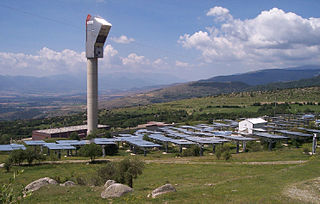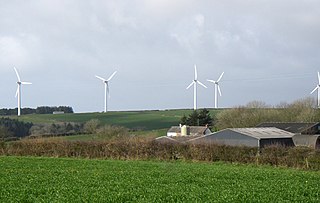The topic of this article may not meet Wikipedia's notability guidelines for companies and organizations .(December 2010) |
Ecopower is a Belgian cooperative founded in 1991, financing renewable energy projects in Flanders.
The topic of this article may not meet Wikipedia's notability guidelines for companies and organizations .(December 2010) |
Ecopower is a Belgian cooperative founded in 1991, financing renewable energy projects in Flanders.
Since the liberalisation of the energy market in Flanders (July 2003) Ecopower became a supplier of green electricity produced in Belgium. At the end of 2010 1% of the Flemish households were supplied by Ecopower. [1] [2] [3] It inspired other energy cooperatives across Europe. [4]
The cooperative buys and builds renewable electricity units, such as wind turbines and water turbines, in Belgium. [3] [5] Projects in recent years include the placement of wind turbines in Eeklo, Gistel and Ghent, and the placement of hydroelectric turbines in Rotselaar, Hoegaarden and Overijse. In 2020, Ecopower and ECoOB (another cooperative) initiated a solar-energy project in Leuven, by building solar installations on 10 public roofs and offering citizens the opportunity to become co-owners. [6]
The cooperative claims 50000 members in 2017. [7] 40 % of Ecopower clients have installed solar panels on their buildings. [8]
Ecopower is member of the Belgium group of renewable cooperatives REScoop.be and the European group of renewable cooperatives REScoop.eu.

Renewable energy progress in the European Union (EU) is driven by the European Commission's 2023 revision of the Renewable Energy Directive, which raises the EU's binding renewable energy target for 2030 to at least 42.5%, up from the previous target of 32%. Effective since November 20, 2023, across all EU countries, this directive aligns with broader climate objectives, including reducing greenhouse gas emissions by at least 55% by 2030 and achieving climate neutrality by 2050. Additionally, the Energy 2020 strategy exceeded its goals, with the EU achieving a 22.1% share of renewable energy in 2020, surpassing the 20% target.

The THEMIS solar power tower is a research and development centre focused on solar energy. It is located near the village of Targasonne, in the department of Pyrénées-Orientales, south of France, 3 kilometres from the world's largest solar furnace in Odeillo.

As of 2023, Europe had a total installed wind capacity of 255 gigawatts (GW). In 2017, a total of 15,680 MW of wind power was installed, representing 55% of all new power capacity, and the wind power generated 336 TWh of electricity, enough to supply 11.6% of the EU's electricity consumption.

Renewable energy in the United Kingdom contributes to production for electricity, heat, and transport.

Wind power in Finland has been the fastest growing source of electricity in recent years. In 2023, Finland covered 18.2% of the yearly electricity demand with wind power production, which was 18.5% of the domestic production. Wind capacity was up 1.3 GW from the previous year and wind production up 25%. This compares to an average wind power share of 19% in the EU.

Community wind projects are locally owned by farmers, investors, businesses, schools, utilities, or other public or private entities who utilize wind energy to support and reduce energy costs to the local community. The key feature is that local community members have a significant, direct financial stake in the project beyond land lease payments and tax revenue. Projects may be used for on-site power or to generate wholesale power for sale, usually on a commercial-scale greater than 100 kW.

Energy in Belgium describes energy and electricity production, consumption and import in Belgium.

EDF Renewables is a wholly owned subsidiary of the French utility EDF Group, specializing in renewable energy production. As an integrated operator, the Group develops and finances the construction of renewable energy facilities, and manages operations and maintenance for its own account and for third parties.

Wind power in Belgium depends partially on regional governments and partially on the Belgian federal government. Wind energy producers in both the Flemish and Walloon regions get green certificates but not with the same conditions.

As of November 2023, wind power in the Netherlands has an installed capacity of 11,602 MW, 40.9% of which is based offshore. In 2022, the wind turbines provided the country with 18.37% of its electricity demand during the year. Windmills have historically played a major part in the Netherlands by providing an alternative to water driven mills.

As of 2019, renewable energy in Morocco covered 35% of the country’s electricity needs.

Energy in Malta describes energy production, consumption and import in Malta. Malta has no domestic resource of fossil fuels and no gas distribution network, and relies overwhelmingly on imports of fossil fuels and electricity to cover its energy needs. Since 2015, the Malta–Sicily interconnector allows Malta to be connected to the European power grid and import a significant share of its electricity.

Energy policy of Belgium describes the politics of Belgium related to energy. Energy in Belgium describes energy and electricity production. consumption and import in Belgium. Electricity sector in Belgium is the main article of electricity in Belgium.

Despite the historic usage of wind power to drain water and grind grain, the Netherlands today lags 21 of the 26 other member states of the European Union in the consumption of energy from renewable sources. In 2022, the Netherlands consumed just 15% of its total energy from renewables. According to statistics published by Eurostat, it was the last among the EU countries in the shift away from global warming-inducing energy sources. The leading renewable sources in the country are biomass, wind, solar and both geothermal and aerothermal power. In 2018 decisions were made to replace natural gas as the main energy source in the Netherlands with increased electrification being a major part of this process.

Solar power in Belgium reached an installed capacity of 4,254 MW of power generating 3,563 GWh of electricity in 2018. In 2015 PV solar power accounted for around 4% of Belgium's total electricity demand, the 4th highest penetration figure in the world, although the country is some way behind the leaders Germany, Italy and Greece at between 7% and 8% of electricity demand.
REScoop.be is the Belgian branch of the European group of cooperatives for renewable energy, REScoop.eu.
REScoop Vlaanderen is the energy cooperative for renewable energy in Flanders, Belgium.
Wase Wind is a Flemish energy cooperative, active in the production of renewable energy and the supply of electricity from wind turbines.